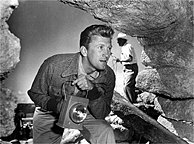The AP's Iraq Black Eye Grows Larger
The Associated Press tried to ignore the black eye it garnered for its repeated use of stories from Iraq by Jamil Hussein, created from whole cloth as disingenuous propaganda to discredit the US. As I wrote last January, “AP says UP Yours: Newspaper Unaccountability”:
The latest response by Associated Press executive editor Kathleen Carroll to the inability of any independent investigation to unearth the AP’s ghost informant, Jamil Hussein, should be headlined, “AP says UP yours,” instead of the E&P’s “Continues to Stand by Reporting.”
Ms. Carroll, apparently, feels well insulated from the public as she is from verifiable facts or accountability….
One wonders how to penetrate the insularity of such media barons like Carroll.
The Associated Press does not have an ombudsman, a representative of the public customers, nor does it present a complaint line, nor email addresses for its Board. The public’s sole recourse is via the owners of local newspapers who subscribe to the AP wire. It is only through that very attenuated route that a reader may hope to have any impact.
The US has now turned AP photographer Bilal Hussein over to the Iraqis for trial:
Now, comes this blast from the president and chief executive of Associated Press, Tom Curley, in defense of its photographer in Iraq, Bilal Hussein:In Washington, Pentagon press secretary Geoff Morrell explained the decision to bring charges now by saying “new evidence has come to light” about Hussein, but said the information would remain in government hands until the formal complaint is filed with Iraqi authorities.
Morrell asserted the military has “convincing and irrefutable evidence that Bilal Hussein is a threat to stability and security in Iraq as a link to insurgent activity” and called Hussein “a terrorist operative who infiltrated the AP.”
We believe Bilal's crime was taking photographs the U.S. government did not want its citizens to see. That he was part of a team of AP photographers who had just won a Pulitzer Prize for work in Iraq may have made Bilal even more of a marked man.
In the 19 months since he was picked up, Bilal has not been charged with any crime, although the military has sent out a flurry of ever-changing claims. Every claim we've checked out has proved to be false, overblown or microscopic in significance. Now, suddenly, the military plans to seek a criminal case against Bilal in the Iraqi court system in just days. But the military won't tell us what the charges are, what evidence it will be submitting or even when the hearing will be held….
Perhaps it is not surprising that the operators of the world's largest prison-camp network have found a way to provide access to due process in a form that actually looks more unjust than indefinite imprisonment without charges.
But this is a poor example -- and not the first of its kind -- of the way our government honors the democratic principles and values it says it wants to share with the Iraqi people.
Actually, quite a bit is known about Bilal Hussein. Michelle Malkin presents a useful summary, with Hussein's "convenient" photos, and John Hinderaker at Powerline neatly asks, “How stupid does the Associated Press think we are?”
The coming trial of Bilal Hussein may yet again exhibit why the Associated Press should both avoid Husseins, and should get new management with journalistic integrity instead of journalistic bombastity and self-righteous, self-defensive impermeability to following the facts.
— Bruce Kesler


<< Home